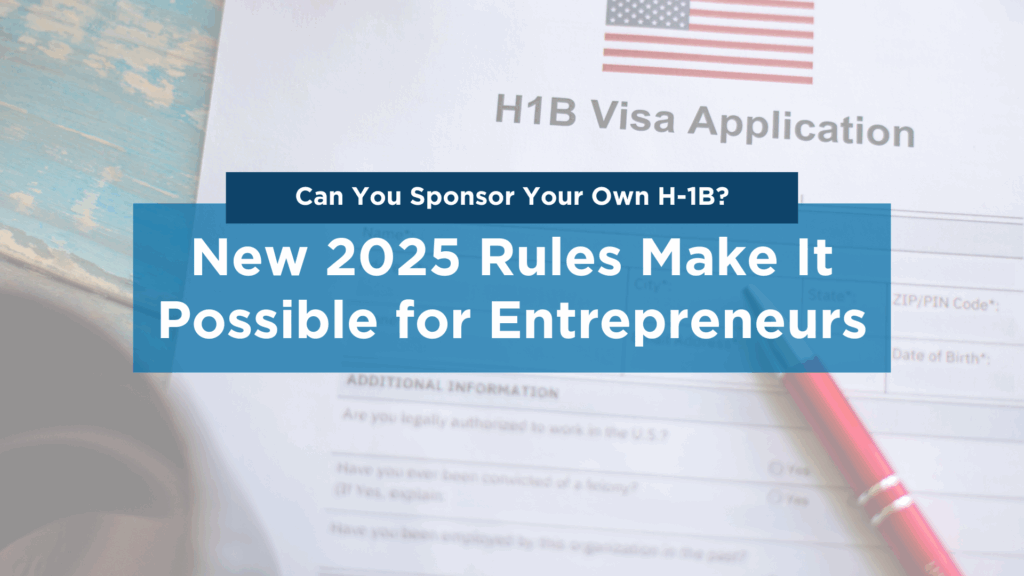
For decades, the H-1B visa program has required that U.S. employers petition on behalf of foreign professionals. But in 2025, a major policy shift is changing that dynamic. Thanks to the H-1B modernization rules introduced in January, qualified entrepreneurs can now sponsor themselves through their own startup — even if they own 100% of the company.
This new pathway opens doors for founders and innovators who want to build businesses in the United States while maintaining lawful work authorization. However, self-sponsorship comes with strict conditions and requires careful preparation.
Self-Sponsored H-1Bs Are Now Possible — But With Key Requirements
To qualify, entrepreneurs must show that their business is a legitimate employer and not simply a vehicle to secure a visa. Below are the core eligibility requirements:
1. A Legally Incorporated Business
- The company must be a separate legal entity (e.g., LLC, corporation).
- USCIS will expect corporate documents such as an operating agreement, EIN, and articles of incorporation.
2. A Valid Employer-Employee Relationship
- Even if you are the founder, the business must have authority over your employment.
- This typically requires a board of directors or other decision-making body that can supervise, evaluate, and terminate your employment if needed.
- Employment agreements should clearly outline your role, compensation, and reporting structure.
3. A Specialty Occupation Role
- The H-1B is still a professional visa.
- At least 51% of your job duties must directly relate to your specialty field.
- The remainder of your time may be spent on management or business operations.
4. Prevailing Wage Requirements
- Self-ownership does not exempt you from wage obligations.
- Your business must pay you at or above the prevailing wage for your occupation.
- USCIS may request evidence such as payroll capacity, bank statements, and funding.
5. A Comprehensive Business Plan
- USCIS will look for proof that the company was not created solely for immigration purposes.
- A strong business plan should highlight projected revenue, funding, and long-term growth strategy.
6. Shorter Initial Approval Periods
- Self-sponsored H-1Bs are first approved for 18 months (rather than the standard 3 years).
- Entrepreneurs may then extend for another 18 months before becoming eligible for a 3-year approval.
- This structure allows USCIS to assess the company’s growth and viability over time.
Strategic Tip: Consider a Concurrent H-1B
If you already hold H-1B status with another employer, you may file a concurrent H-1B petition through your startup.
This approach allows you to:
- Maintain your current job and legal status,
- Work part-time for your startup, and
- Reduce risk if the new petition is denied.
Opportunities for F-1 Students and Beyond
This self-sponsorship option isn’t limited to current H-1B holders. F-1 students on OPT or STEM OPT may also pursue this route, though they must still go through the H-1B lottery.
It may be especially valuable for:
- Graduate students with startup ideas,
- Founders seeking to launch or scale a company, and
- H-1B employees hoping to start a side business.
Final Thoughts
The ability to self-sponsor an H-1B marks a significant shift in U.S. immigration policy, giving entrepreneurs new flexibility to grow businesses in the United States. Still, eligibility depends on strict compliance, strong documentation, and a clearly defined employer-employee structure.
At VKM Law Group, we work closely with entrepreneurs and professionals to navigate these new rules, structure their businesses correctly, and file strong petitions. If you are considering self-sponsorship, we can guide you through each stage to protect your immigration status while pursuing your business goals.
FAQs
Q: Can I work for my own company on H-1B?
Only if you have an approved self-sponsored H-1B petition. Without approval, you cannot perform work for the business.
Q: Can I apply as a sole proprietor?
No. Sole proprietorships are not recognized as separate legal entities for H-1B purposes.
Q: What happens if my petition is denied?
If you also filed a concurrent H-1B, you keep your existing job and immigration status, minimizing risk.
👉 To discuss your options under the new H-1B rules, contact VKM Law Group today.